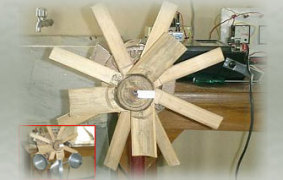Personal profile
The brothers, Nipul Bezbora (25) and Bipul Bezbora (28) hail from Bezgaon, a village in Jorhat district of Assam. They could not complete their education and earned their living by farming and ploughing in neighbouring fields on a daily wage basis. They have their own arecanut plantation.
Genesis
Nipul and Bipul had bought a rice husking machine but were facing problems in separating the rice from the husk when the mixture fell from the machine. To remedy the situation, they built a simple fan to blow the air for the separation. But due to size constraints, they could not get the requisite amount of air to separate the husk. And thus began the journey of improving the innovation. Finally one model made of bamboo was completed on June 15, 2002, which they tested in an innovative test rig that they had developed themselves and the results were successful.
“We are quite amazed by the thinking of the inventors who had no formal training in science and engineering. They should be capable of more.”
This is what Dr.S.R.Kannan, Vice President, Corporate R&D and Quality, Crompton Greaves Ltd., has to say about the accomplishment of Nipul and Bipul Bezbora.
The innovators have developed a multi-bladed, double-layer fan to blow air in order to separate rice and husk when the mixture falls from the rice de-husking and winnowing machine. This unique fan is made of bamboo. Unlike normal fans that have one set of blades circumferentially on the axis, this machine has two sets of larger and smaller blades located circumferentially in the same axial shaft. The bigger blades are eight in number, straight and small in width. The four curved, smaller blades are arranged next to the bigger blades.
The curvature provided to the front blades, which are smaller, helps in sucking the air due to the creation of a vortex and this feature is attributed to the Coanda Effect .The Coanda Effect is the tendency of a stream of fluid to stay attached to a convex surface, rather than follow a straight line in its original direction. The effect is named after Henry Coanda, a young Romanian Engineer who used the principle to power an aircraft in 1910.
The layer of blades at the back functions as in a normal fan and sucks in the air and feeds it into the layer of blades in the front. Because of the unique arrangement of the two layers of blades, a wedging action is formed, which pushes the air forward through the front layer while producing a vacuum in between the blades. As a result, more amount of air is sucked by the back layer at a rapid pace and is channelled out through the front layer. This unique process basically improves the efficiency of the unit and sucks in and delivers more air. Due to the unusual arrangement of the blades, they develop vortex airflow, which results in higher amount of air/unit energy supplied. The cost per unit of the fan is Rs.100/-.
The significance of the innovation is in the arrangement of the blades and their placement, the angle of the blades with respect to the axis, the relative position of the smaller and bigger blades and the direction control of the fan for focusing and distribution of air.
Advantages
A comparative study of the performance of different fan designs with the bamboo fan indicated that the multi-bladed, twin layered bamboo fan has several advantages over conventional designs as (i) higher value of air flow rate per unit sweep area, (ii) higher value of air flow rate at comparatively lower speeds and (iii) less noise. Further, it is environment friendly and saves energy. It is particularly relevant in rural development as it can be used as a Forced-Air Paddy cleaner in the rice mills thus saving on labour cost. Also, since fewer fans are required for a large area, the cost of the equipment is not very high.
A passion to innovate…
Solving local problems using locally available materials and creating unusual but useful devices for domestic needs has always been a passion for Nipul and Bipul. Their other innovations include a fabricated bamboo cycle rickshaw, for carrying their agricultural goods, which they developed in 1995, as well as an arrangement to prevent theft of power tillers. They also modified the power tiller’s mudguards which enabled easier negotiation of ridges in the field and provided a safeguard for the user.
Neither adverse economic condition nor educational disadvantage has hindered these brothers from pursuing their dream of coming up with different innovations. Acknowledgement of their contribution is evident in the title “Vishwakarma” attributed to them by their community. Nipul has also been recognized and awarded as “shilpi” and social worker by “West Jorhat Sahitya Sabha” on the occasion of its centenary celebrations in 1998 especially as he is always ready to offer a helping hand to the villagers for solving their personal problems.







